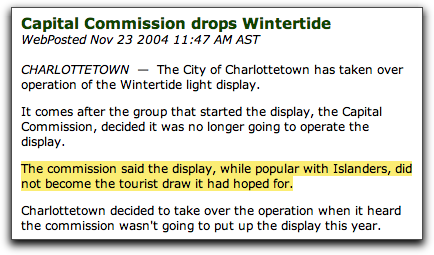From my friend Ann comes a link to this article in the New York Times about Amtrak’s new automated telephone system. I decided to take it out for a test drive. Here’s how it went [4.6MB WAV]. I was impressed, although things did go off the rails in the end when I tried to leave.
Because either we’ve been away, or our family doctor has been away, we managed to miss her flu shot clinic, and now she has exhausted her supply of the vaccine.
Looking for alternative sources, I phoned the Office of the Chief Health Officer. I had to leave a message because there was nobody in the office when I called. An hour later, Dr. Lamont Sweet himself phoned me and gave me the information I needed. Prince Edward Island is very small.
There is a flu vaccine clinic in the basement of the Polyclinic in Charlottetown on Wednesday, December 1, 2004 from 9:30 a.m. to 11:30 a.m. and again from 1:00 p.m. to 4:30 p.m.
Actual header of actual email received from Air Canada this morning:

Carolyn Bertram, Liberal MLA, and Hon. Chester Gillan, Minister of Health and Social Services, had a lengthy exchange during today’s Question Period [RealAudio] regarding the Best Start program.
Bertram is not a great orator: she appears somewhat ill at ease, and sometimes it seems like her passion gets in the way of her clarity. But she’s got passion, and it shows.
Gillan isn’t a great orator either: he tries to play the misdirection “talk loftily and nobody will notice I didn’t answer the question” card, but it doesn’t work, largely because his punch lines just fade away into nothing.
Bertram wanted to know why the Government is freezing funds for Best Start. Gillan wanted to say “we don’t have the money, but we still care about the children.” He didn’t do a very good job.
It wasn’t a decisive victory, but on balance I think Bertram won the day.
Prompted by the example of my officemates, I went shopping for compact flourescent lightbulbs tonight for the house. I was dismayed to find that all brands I could find have a big warning label on the back saying “contains mercury: use proper disposal methods.”
Can anyone point me to an evaluation of the comparitive evils of the presence of mercury in these bulbs vs. the energy they save?
The bar formerly know as “The Playhouse” at the corner of University Ave. and Fitzroy St. in Charlottetown, under renovation for as long as anyone can remember, reopens Wednesday, November 24 at 5:00 p.m.
As far as I understand, the Reid family, formerly of JR’s (etc.) down by the railway station, are the owners now. I think their renovation qualifies as the slowest in history; I’m quite excited to see the results inside.
My first meal out with a Real Islander (okay, he wasn’t born here, but he had recorded a CD of his songs, many of which were odes to PEI, so I think he qualified for some sort of “early-release program” from mainlandedness) was at the basement restaurant at JR’s. There was a lot of beef involved. And country music. It was great.
Here is a useful resource if you’re a BBEdit user: lets you know how to do more sophisticated search and replace operations. Amazing what you can do with a little imagination.
In 2001 I called them abominable and inane. In 2002 I asked:
…why is it that the expensive centrepiece of our primary secular and religous holiday consists of a illuminated duck drinking from an illuminated champagne fountain?
Finally the Capital Commission has come to its senses; here’s a clip from a story running on the CBC Prince Edward Island website (emphasis mine):

Give them a few more years and they’ll have Founder’s Hall converted to something useful, and Nickelback banned from the waterfront.
 I am
I am